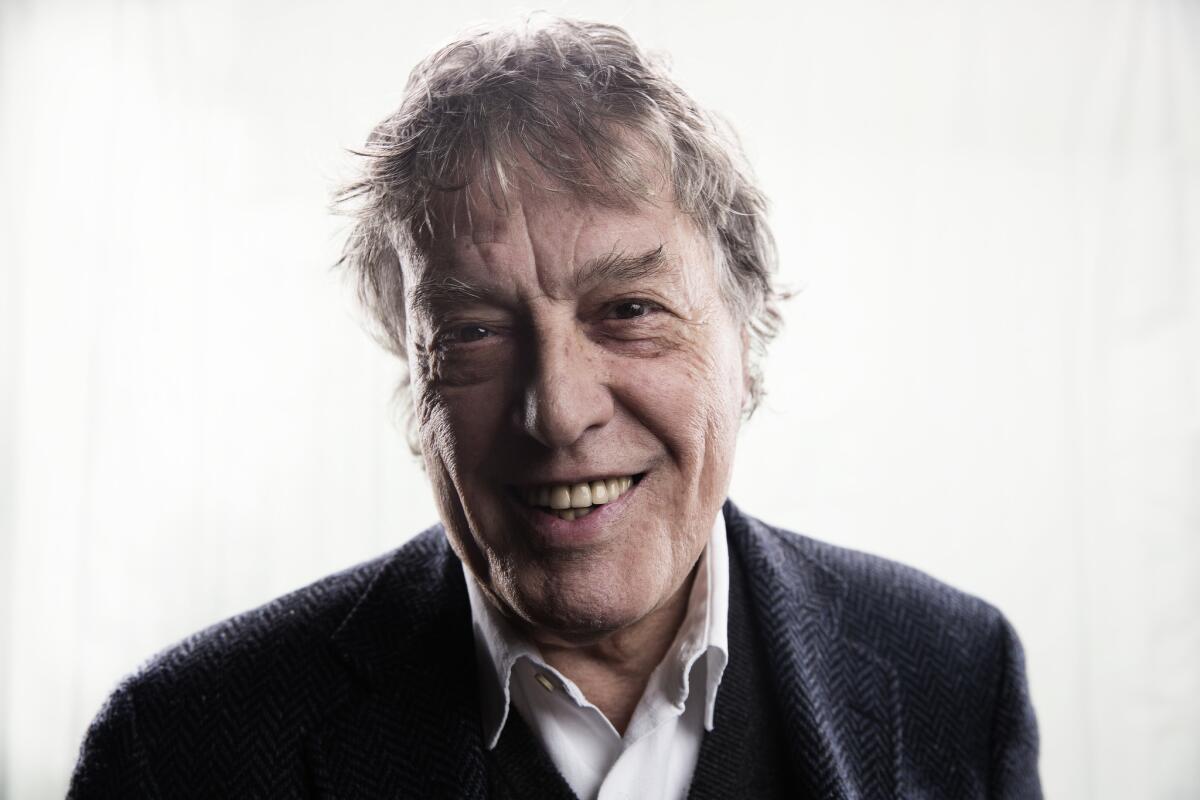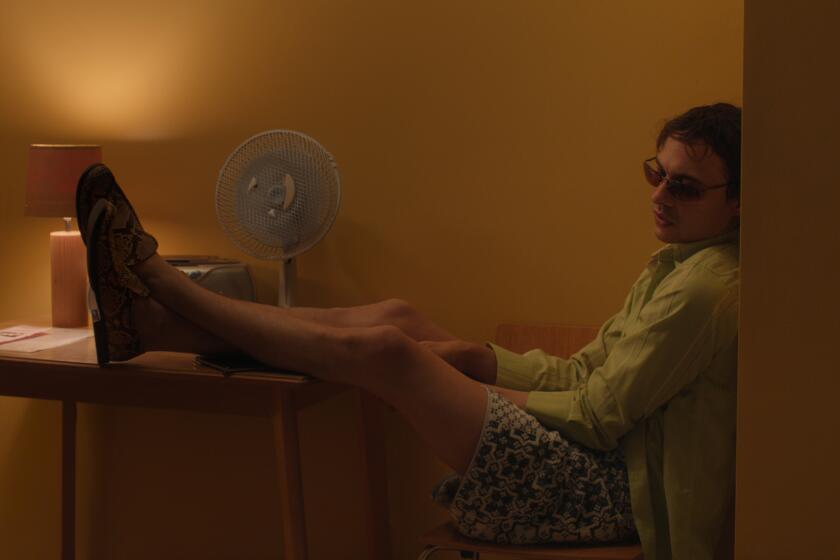Playwright Tom Stoppard recalls first and last film he directed, his own ‘Rosencrantz & Guildenstern’

Tom Stoppard in London in 2013.
- Share via
Tom Stoppard became an overnight success at age 29 when his play “Rosencrantz & Guildenstern Are Dead” was staged at the Edinburgh Fringe Festival in 1966. A year later, the National Theatre production opened at the Old Vic in London and on Broadway, where it won four Tony Awards, including best play.
The absurdist comedy revolves around the two minor characters — Rosencrantz and Guildenstern — from Shakespeare’s “Hamlet.” The two are always in “the wings” of the Bard’s tragedy, where they briefly interact with the major characters from that play including Hamlet, Ophelia, the Player and Polonius and have no idea of their tragic fate.
Hollywood soon took interest in this young playwright and his existential comedy.
“I think there was some interest, I think, from MGM,” said Stoppard, 78, by phone from his country home in Britain. British director John Boorman (“Deliverance”) was initially attached to the project.
“I remember then sitting down writing a script for John and realize looking back I had no idea what a screenplay was,” said Stoppard, who has written such award-winning plays as “The Real Thing,” “Arcadia,” “Travesties” and “Night and Day.” He won an Oscar for co-writing the 1998 Academy Award-winning best film, “Shakespeare in Love.”
See more of Classic Hollywood on Facebook >>
Had the Boorman-directed film come to fruition, Stoppard said, “it would have been a heavy number.”
But by the time he wrote the screenplay to “Rosencrantz” for the 1990 film version that was released theatrically in 1991, Stoppard had several film projects to his credit, including co-writing Terry Gilliam’s 1985 classic, “Brazil.”
“I knew enough to know that [a screenplay] shouldn’t get too wordy,” Stoppard said. “I felt by that time that I knew a little more about writing screenplays, though I still don’t know enough until this day, really.”
He also wasn’t a young Turk any more. “What happens when you get older is that you feel freer and looser about defending or protecting your original text,” Stoppard said. “I started having fun with it.”
The comedy, which stars Gary Oldman as Rosencrantz, Tim Roth as Guildenstern, Richard Dreyfuss as the Player, Iain Glenn as Hamlet, Joanna Miles as Gertrude and Ian Richardson as Polonius, received generally strong reviews and even won the Venice Film Festival’s top prize over the odds-on favorite, Martin Scorsese’s “Goodfellas.”
“Gore Vidal was the head of the judges and loved the movie,” noted the film’s producer, Michael Brandman. “He thought it was reflective of everything the Venice Film Festival should be celebrating.”
And now the film has just been released in a 25th-anniversary edition on Blu-ray and DVD with an interview with Stoppard.
Brandman had always been a huge fan of the play and felt it would make a good movie. His friend fellow producer Emanuel Azenberg, who had produced “The Real Thing” on Broadway, arranged a meeting between Brandman and Stoppard in London.
But Stoppard recalled being initially trepidatious. “I think they had to ask me more than once,” he said. “In my usual way I backed off. I wasn’t sure about making films out of plays.” (“Rosencrantz & Guildenstern” is the only Stoppard play to be adapted for cinema.)
After Stoppard did agree, Cinecom Pictures became interested in getting involved in the distribution of the movie, Brandman said, “if we could raise the money. My old boss Lee Rich was running MGM, which controlled the underlying rights, and I was able to secure those. Then we set out in search of a director.”
They didn’t have to look far. Stoppard’s feature directing career began and ended with “Rosencrantz & Guildenstern.”
“It’s hard to explain why I ended up doing it,” Stoppard said. “My memory of this is that it made it easier to get the little money we needed if the writer was directing it. I think the theory being since I had never directed a film, I might turn out to be a great film director. I realized pretty soon that if this was going to be adjusted and adapted, I was the person who would be the least defensive about it. I felt it needed a bit of disrespect. My fear was it would be over-respected and would look like a filmed play.”
Though Roth jokingly described himself as “sort of young and stupid” in 1990, he knew who Stoppard was and had read some of his plays before he was sent the script.
“It’s a terrific read,” said Roth, who is in Quentin Tarantino’s latest film, “The Hateful Eight.”
Roth met with Stoppard at his place in London about the film. “Gary Oldman was there,” Roth said. “We worked together before with [director] Mike Leigh. Me, Tom and Gary sat and chatted. He was very interested in bringing us together as the characters.”
But Daniel Day-Lewis, who was appearing in London’s West End in “Hamlet,” was also interested in Guildenstern. In fact, Stoppard said, he was supposed to see Day-Lewis in the play that night.
Roth “told me he assumed that was the end of that if Daniel Day-Lewis was already interested,” Stoppard said. “I showed up at the theater and found out that Daniel Day-Lewis was off that night. I never did get to see him.”
And that’s how Roth got the part. “I owe Danny big time,” the actor said, laughing.
Roth noted the film was probably more in “Gary’s wheelhouse” than his at the time. “I don’t know if you saw Gary on stage. He was an incredible stage actor. We would flock to see him, so he was more ready. I was completely not ready. I had done theater, but I hadn’t done the classics. I was very nervous about the Shakespeare aspect of it.”
So Roth had to have that fear “slapped out of me by Tom,” who told Roth just to treat the Shakespearean language “as modern dialogue. It took me a while to adjust to it, but I have to say I really loved it.”
The film was shot in and around Zagreb in Croatia. “It was a marvelous, intense period,” Stoppard said. “I think we shot for 35 days.”
Stoppard asked for advice from his crew, including cinematographer Peter Biziou. “It would have been nice to have made a film before this one,” Stoppard said. And though he likes the film, “I would probably like to take a few minutes out of it.”
As to why he never directed another feature, Stoppard said that “I didn’t consider myself a film director then, and I don’t consider myself a film director now. It just made life easier.”
More to Read
Only good movies
Get the Indie Focus newsletter, Mark Olsen's weekly guide to the world of cinema.
You may occasionally receive promotional content from the Los Angeles Times.











